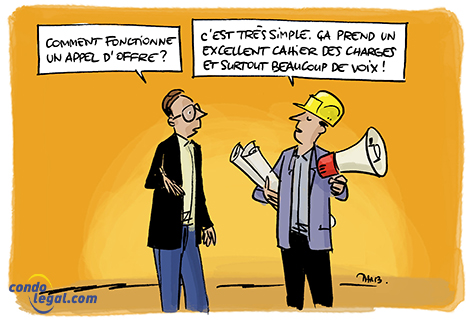Call for tenders for co-ownership work
 Choosing a contractor is a crucial step that should not be taken lightly! Indeed, renovation and construction work constitute a significant budget item, and it is essential that the board of directors takes measures to choose a reliable contractor, ensuring transparency and competitiveness for co-owners. A well-structured and rigorous process is key to avoiding unpleasant surprises and ensuring the quality of the work carried out. Furthermore, a well-conducted call for tenders process can not only reduce costs but also ensure better project management. This diligence ultimately protects the interests of all co-owners.
Choosing a contractor is a crucial step that should not be taken lightly! Indeed, renovation and construction work constitute a significant budget item, and it is essential that the board of directors takes measures to choose a reliable contractor, ensuring transparency and competitiveness for co-owners. A well-structured and rigorous process is key to avoiding unpleasant surprises and ensuring the quality of the work carried out. Furthermore, a well-conducted call for tenders process can not only reduce costs but also ensure better project management. This diligence ultimately protects the interests of all co-owners.
Selection method
Establishing a contractor selection procedure is essential. For minor work, this procedure remains relatively simple, involving the search for an appropriate contractor through a request for bids and due diligence conducted by the board members or the manager. However, for major work, the process can be more complex, initially requiring the preparation of specifications and plans by a building professional, and putting the bidding contractors in competition through a formal tender process.
Why launch a call for tenders?
There is no legal obligation for the board of directors to proceed by way of tender for planned work. The choice rests with the board members, depending on the circumstances, particularly due to the complexity or scope of the work. The advice of a building professional (professional technologist, engineer, architect) is crucial in this regard.
What is a call for tenders?
A tender is a process by which a project owner (the one who orders the work) calls on several contractors, based on objective criteria that contractors are aware of in the tender documents. This process aims to promote competition to obtain the best possible offer, which is not necessarily the least expensive. It is generally a quite cumbersome (and costly) process, so it is reserved for large-scale projects that justify the approach.
Steps of the call for tenders process
The first step is to clearly define the needs of the co-ownership. Then, a building professional, chosen by the syndicate, prepares a specifications document. This document details the nature of the work to be done, its duration, the start and end dates, as well as the payment terms and applicable guarantees.
The tender can be published on specialized platforms, newspapers, or directly sent to potential contractors. Once the bids are received, they must be analyzed by the retained building professional and compared based on the criteria established in the specifications document.
Types of call for tenders
There are two types of tenders: the general tender, open to all contractors (general or specialized, depending on the case), and the invitation-only tender, where the project owner pre-selects contractors, addressing only certain ones in the concerned field. Generally, this second type is found in divided co-ownerships.
Number of bids: What practices to adopt?
In Quebec, there is no law requiring a minimum number of bids for large-scale work in a co-ownership. However, several practices are recommended to ensure rigorous and transparent management. First, it is essential to check the declaration of co-ownership, which may include specific rules regarding calls for tenders. In the absence of such rules, obtaining at least 2 to 3 bids is a good practice to compare prices, evaluate the quality of contractors, and justify your choices to co-owners. Finally, even without a legal obligation, it is important to document the selection process to comply with the directors’ duties of diligence and transparency, while strengthening the trust of co-owners.
Contract of enterprise
Besides preparing a tender document, the board of directors will eventually conclude a contract of enterprise with the chosen contractor, especially when the work is significant or complex. Negotiated between the parties, the content of this contract will detail the work, their completion deadlines, payment terms, execution schedule, penalties applicable in case of delay, unforeseen site issues, the possibility of subcontracting, dispute resolution methods, etc. This contract should impose the obligation on the contractor to provide guarantees, such as adequate liability insurance coverage or a performance bond. If necessary, specific qualifications (master electrician, master plumber, etc.) can also be required.
 WHAT YOU SHOULD KNOW ! The tender process aims to promote competition to obtain the best possible offer, which is not necessarily the least expensive. It is generally a quite cumbersome (and costly) process, so it is reserved for large-scale projects that justify the approach.
WHAT YOU SHOULD KNOW ! The tender process aims to promote competition to obtain the best possible offer, which is not necessarily the least expensive. It is generally a quite cumbersome (and costly) process, so it is reserved for large-scale projects that justify the approach.
 WHAT TO KEEP IN MIND : A tender is a process by which a syndicate of co-owners solicits proposals from different contractors for carrying out work or providing services. The objective is to compare several offers to choose the one that offers the best value for money.
WHAT TO KEEP IN MIND : A tender is a process by which a syndicate of co-owners solicits proposals from different contractors for carrying out work or providing services. The objective is to compare several offers to choose the one that offers the best value for money.
 WARNING ! The declaration of co-ownership might require a tender for certain types of work, or when they exceed a certain amount, but this is very rare.
WARNING ! The declaration of co-ownership might require a tender for certain types of work, or when they exceed a certain amount, but this is very rare.
Back to the mega-factsheet: The work of the syndicate





